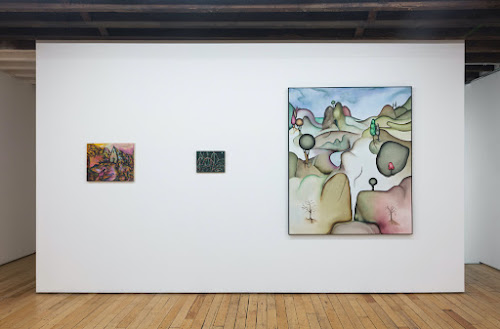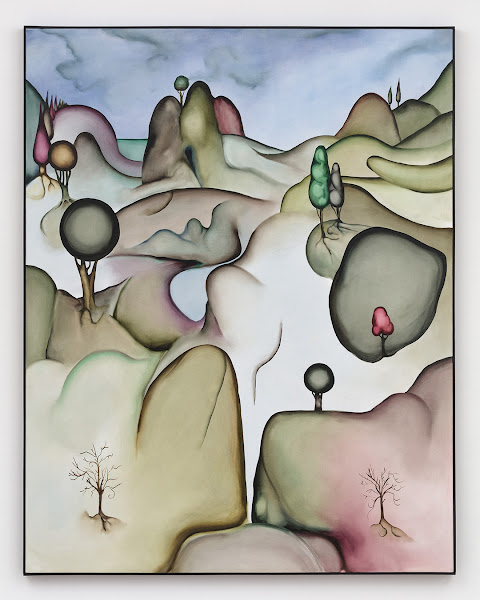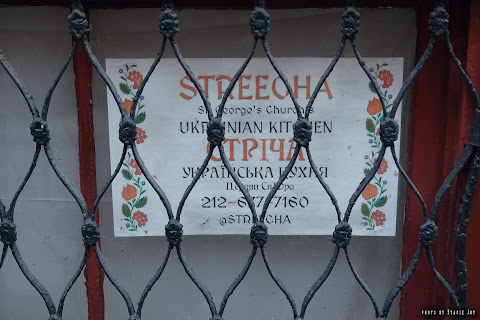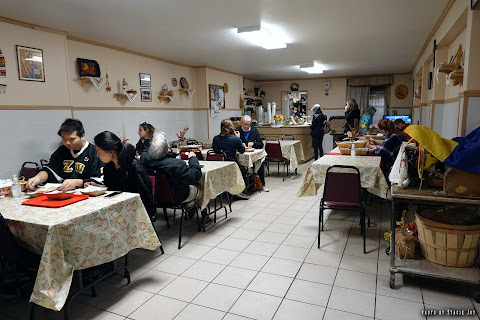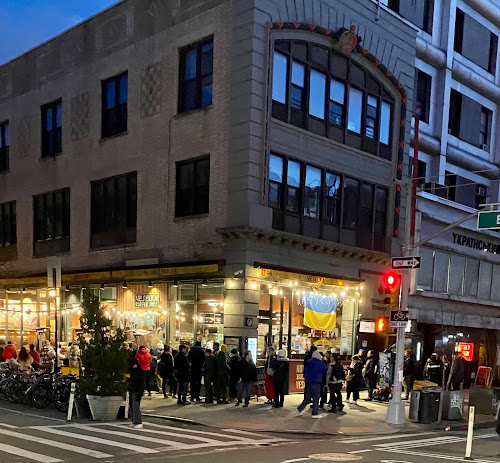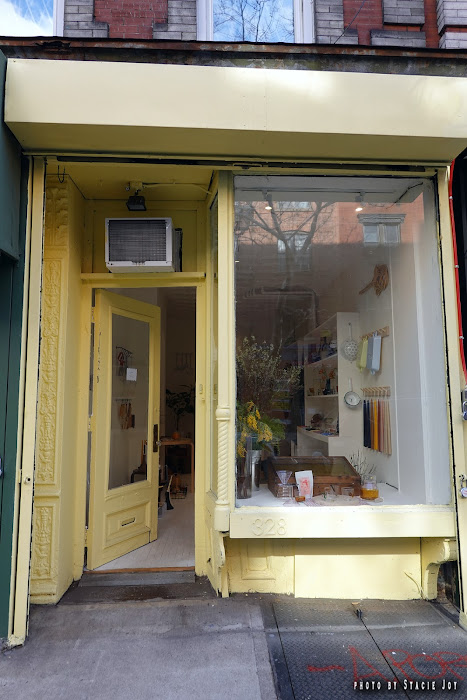Friday, March 4, 2022
Have the 'Blues'
A mid-morning view of a favorite intersection
One East Village family's protest against the Russian invasion of Ukraine
"When we in 1971 arrived in this East Village neighborhood it was still a vital immigrant population. Its larger mix was of Ukrainian, Polish and Italian heritage, their cultures so shared with us. Now those populations are slowly fading away and their children have moved on. Their restaurants, spoken languages, music, and beautiful colored flags have largely fallen silent. But their cultural contribution live on in us all, and our neighborhood history to remember," he wrote. "Now I am pleased to honor Ukraine's national flag colors as their Peace Dove."
The New Colossus Festival takes place next week at these local music venues
Thursday, March 3, 2022
Gallery Watch: Robert Zehnder at Rachel Uffner
The American regionalist painters lend a lot of influence to my work. Though, they are not my only inspiration. The works of Grant Wood and Thomas Hart Benton were an entry point to the landscape paintings. I looked to them mostly for their formal attributes. Though, the context of their works and why they were making them do apply to my conceptual inspirations as well. These artists were producing imagery during the post-industrial revolution, capturing the turbulence of the early 20th century. The visual perspectives are skewed and the mundane American life depicted is electrified with unease.
Bosch and Bruegel are also great inspirations to me. What I see in their works is that there is no visual hierarchy. Like many of their contemporaries, a centralized figure typically dominates the composition, creating an imbalance of focus.
Fragonard’s palette is beautiful. I was recently looking at Progress of Love (1771-2) at the Frick. Such a fantastic series of works, yet, I do not have any intentional relation to Roccoco at the moment.
Could you break down your process in creating, say, Desk Shaped Stone (2022, above)?
Desk Shaped Stone most likely started with me drawing a few of the circular trees. From there, I would draw in hills and lines, leave some places blank and then paint from the top down, starting with the sky. I typically have an idea of the palette, but a lot is done or decided on the canvas. It is a lot of moving color and removing paint with a rag to then reapply. The act of making these works is primarily expressionistic.
This work specifically is about Bellini’s Agony in the Garden (1459-65). They say that the stone Jesus is leaning before and praying upon is shaped like a desk or an alter. That stone is depicted at the bottom of the canvas, and I also see it as two knees in a robe.
Yes. My works want to talk about the power of allegory in painting, but there aren’t any allegories in the work. Though, that may be up to the viewer’s discretion. I became fascinated with the landscapes in early renaissance paintings, which typically lay behind the figure or the symbol. These landscapes do not intend to be allegorical.
I am interested in what that implication of expanse meant back then. At the time, most people who would view these artworks had no understanding of when and where the pastoral began or ended. This feeling of boundlessness had a very different meaning to its viewers of the time. Today, we understand all-natural land to have had some sort of eyes on it or to have been documented or known to one degree or another. I wonder how we understand a ‘worldly boundlessness’ in the age of now.
I look at religious paintings through an ontological lens. I am excited about how they operated during their time of creation and how they function today. Being a visual artist, there is a lot to investigate and learn from biblical art and architecture. For example, Desk Shaped Stone may be inspired by a religious artwork, but there aren’t any images or symbols that signify anything from the bible.
For me, the phantasmagoric comes to mind when thinking about any high-fidelity artifice we engage with. Whether or not my works are phantasmagoric is up to the viewer. They do, however, want to talk about feelings of being in an altered state - ones that are not necessarily drug-induced, but rather those that are so believable yet, untrustworthy.
A Shadow Following (2022), by Erica Mao, is a work that I keep returning to and spend a lot of time with. It has a great palette and composition, and I believe its title and theme relate to my work conceptually. Erica and I had conversations leading up to the show in which we spoke about the uncanny and how specific regions are fruitful for fiction. This work definitely achieves those similarities.
Erica’s ceramics I see to be very complementary to the paintings I have in the show. There is a great relationship between the objecthood of the ceramics and the pictorial qualities of the paintings. They are exhibited on low-lying circular pedestals we designed together. The pedestals are made of slatted wood and are finished with a very dark stain. They create a great weight in the center of the show, like two mirrored wells, and the ceramics are our memories or visions of hidden sheds and geological formations we may or may not have come in contact with within our conscious reality.
What makes you gravitate toward the Hudson River School art movement? Does it hold any personal significance?
What interests me about the Hudson River School is how those artworks operated within their time. Once again, I am viewing these artworks ontologically. They utilized idealist naturalism to depict the untouched regions of the Americas, which coincided with the development of American tourism. The artworks were allegories themselves. The landscapes were soaked in the light of God. This goes back to what I was saying about the high-fidelity artifice.
Are your landscapes melting or static?
They are melting rather than static. But I wouldn’t use melting because that alludes to a singular direction of movement. I would describe them as being in a constant state of change. Different moments of perspective arrive and disappear in vignettes and blend with one another while also negating one another. The painting is a still image of this.
Atmospherically speaking, are your landscapes earthly or other-worldly? Perhaps, they are a mix of both?
I would say Earthly. They are very much our local environments. If these local environments appear to be altered, that distortion is coming from a place within rather than a place outside.
Another visit to Streecha Ukrainian Kitchen
The cafe is also collecting donations to support the Ukrainian Army ... Streecha is at 33 E. Seventh St. between Second Avenue and Cooper Square. They are open 9-5 Wednesday through Sunday.
Today is the last day for Davey's Ice Cream on 1st Avenue
Wednesday, March 2, 2022
Wednesday's parting shots
Happening now: I'm giving remarks at St. George Ukrainian Catholic Church in New York City to show support for our Ukrainian neighbors. https://t.co/rlH7utfP9T
— Kathy Hochul (@GovKathyHochul) March 3, 2022
What was up with that plane today?
How Veselka is helping with Ukraine relief efforts
A quick visit to Jane, now open on 9th Street
Second time around: A Repeat Performance pops up at 3rd and B'Zaar
A Repeat Performance Market is a tribute to the past days of the East Village that we cherish so much: the artists, creatives and small business owners that made this neighborhood what it is.The sign in our window used to proudly hang on 1st Ave at the shop A Repeat Performance which was open for over 30 years. Sadly, this shop and many other East Village classics have shut their doors for one reason or another.3rd & B’zaar strives to bring support to small businesses like these that need a fresh start or are just getting started by offering space in a brick and mortar shop at an affordable rent.
Tuesday, March 1, 2022
March 1
'Gossip Girl' is filming today xoxo
City has unvaccinated educators doing remote learning now from the former St. Brigid School
Demolition watch: B Bar & Grill edition
Monday, February 28, 2022
Monday's parting shot
Grub street
6 posts from February
RIP Nick Zedd
Back in 1985, Zedd coined the term the “Cinema of Transgression” to describe the campy movies full of shocking sex and violence that he and other artists like Lydia Lunch, Richard Kern, and Kembra Pfahler were making on the Lower East Side. They were scrappy movies shot on 16mm often with pornographic punchlines.Among the social media tributes...
R.I.P. Nick Zedd, the NYC underground filmmaker who coined the "Cinema of Transgression" movement. pic.twitter.com/FxsqQLPsQk
— Film at Lincoln Center (@FilmLinc) February 27, 2022
Farewell to American filmmaker Nick Zedd (1958-2022), who spearheaded the 'Cinema of Transgression' movement in the 1980s, edited the Underground Film Bulletin and joined the dots between Kembra Pfahler, Richard Kern, Tessa Hughes Freeland, Lung Leg and Lydia Lunch. pic.twitter.com/OveAVS3Jbh
— Robin Rimbaud - Scanner (@robinrimbaud) February 27, 2022
Extremely sad to hear of Nick Zedd's passing. The real deal. His work (along with Kern, Lunch, Wojnarowicz, Dick, etc) is a necessary station for anyone with even half an interest in what lies beyond the gated enclaves of boundaried taste. A mad genius of the cinema.
— thee deklane (@theedeklan) February 27, 2022
Zedd is survived by his partner of 15 years, Monica Casanova, his son Zerak and step-daughter Amanita Funaro.RIP Nick Zedd, one of the realest to ever do it. Watched all his films (and public access work 🙃) in a 24hr period a few months back and permanently broke my brain in the process. Max respect to a true underground king! pic.twitter.com/QSmGGF3pi9
— ᘻᓰᖽᐸᘿ 𝔹 (@_RareArt) February 27, 2022






